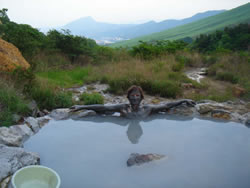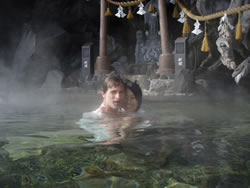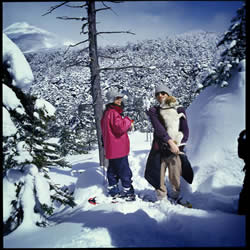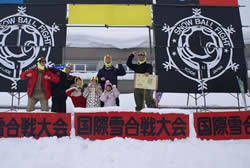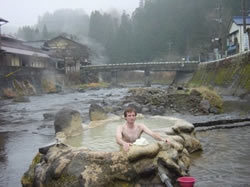- Home » Expat Articles » Interviews » US Expat Living in Niigata, Japan - Interview With Greg
US Expat Living in Niigata, Japan - Interview With Greg
| Published: | 11 Apr at 9 AM |
Want to get involved?
Become a Featured Expat and take our interview.
Become a Local Expert and contribute articles.
Get in touch today!
Become a Local Expert and contribute articles.
Get in touch today!
Filed: Interviews,Japan
Greg Goodmacher planned from an early age to live and work abroad. His educational background is in TEFL/TESL. He has lived in five different countries: the U.S., Thailand, South Korea, the United Arab Emirates, and Japan. For work and play, he has visited more than twenty other countries. Living in the United States would be too comfortable or easy for him. He feels that, in a strange way, the anxiety, or the edge of being an outsider, keeps him on his toes. For relaxation and a sense of wellness, he depends on long soaks in hot springs. Greg's expat blog is called Onsen (Hot Spring) Addict in Japan (see listing here)
Where are you originally from?
I was born in New York, but I grew up in the San Francisco Bay Area of California.
In which country and city are you living now?
I am now living in Niigata, Japan.
How long have you lived here and how long are you planning to stay?
Approximately nineteen years have passed since I first arrived in Japan. My plan is to stay in Japan in the near future as I have specific goals related to being in Japan: continuing with my blog about Japanese hot springs, writing a cultural guidebook to Japanese hot springs, writing travel and culture articles, and learning to teach Japanese students more effectively. However, if a challenging opportunity arose in another country, I would consider moving.
Why did you move and what do you do?
I left America about twenty-five years ago to work as a Peace Corps volunteer in a remote area of Thailand. Since then, I have lived in five countries and have worked and traveled in many others. Directly experiencing different cultures stimulates me. My work mainly revolves around teaching English, environmental issues, intercultural communication, and facilitating international relations between educational organizations and students. In addition, I also write textbooks, newspaper and magazine articles, and a blog about Japanese onsen.
Did you bring family with you?
I left America alone, but I now have a small family of three: me, my wife, my dog.
How did you find the transition to living in a foreign country?
The transitions to living in Japan and to living in Thailand were fairly easy. Of course, there were terrible times when I suffered from culture shock. I found living in South Korea to be very difficult, though. My time in the Arab Emirates was also uncomfortable. I felt a lot of hostility from my Arab students and neighbors. This was during the start of the war in Afghanistan after 9/11, and I am an American. My Japanese wife was discriminated against in that country and she was harassed by many men, so I was very uncomfortable and shortened my stay in Abu Dhabi. However, the expat community of teachers in Abu Dhabi was wonderful. I have found that many specific social, psychological, and political variables affect one`s comfort level regarding living in a foreign country.
Was it easy making friends and meeting people; do you mainly
socialise with other expats?
Developing light friendships with people in my current community, Niigata, Japan, is very easy. However, developing deeper relationships is difficult. Making good friendships in other areas of Japan was much easier. Niigata is the fifth location in Japan for me. I often wonder if the reason for my current difficulty in developing meaningful friendships is that I am now older or if it is that people in Niigata have a more traditional and restrictive view of in-group and out-group relations. Most of my socialization within my current location in Japan is with Japanese people. The expat community here seems spread out. If I spent more time in pubs in the downtown area, I would probably have more expat friends. Moreover, expats with children tend to bond more easily than those without children, and I do not have children.
What are the best things to do in the area; anything to recommend to future expats?
Be physically active and travel all over Japan. Many people think that Japan is homogenous, but there is quite a bit of regional variation. Japan`s mountains and open spaces are fantastic. Of course, explore and enjoy as many hot springs as possible. The Japanese hot springs are awesome.
What do you enjoy most about living here?.
I like the hot springs, the food, mountain climbing and hiking in both summer and winter. Camping on remote islands brings me great joy, and Japan has thousands of islands.
How does the cost of living compare to home?
Japan is much cheaper than many people imagine. The inflated prices of items within the most inflated areas of Japan make the news, but those prices have little in common with the average prices in Japan. Due to deflation, Japan has become cheaper in the last ten years. In fact, when I visit my hometown in California, I am always shocked by the increasing prices and taxes.
What negatives, if any, are there to living here?
Due to the nuclear accident in Fukushima, increased levels of radioactivity have become a strong negative point. Depending upon where you live in Japan and your Japanese abilities, there could be few learning opportunities. For example, in the large city of Nagoya, my friends can join writing groups for English speakers, study shiatsu in English, and act in an English drama performance. None of these opportunities exist in the remote area where I live.
If you could pick one piece of advice to anyone moving here, what would it be?
Try as much as possible to view any conflicts from other perspectives, but do not give up your sense of self.
What has been the hardest aspect to your expat experience so far?
The answer to this question relates to the earlier question about the negatives of living where I am. I feel frustrated because I cannot study many things that I want to study here.
What are your top 5 expat tips for anyone following in your footsteps?
Tell us a bit about your own expat blog.
I am addicted to Japanese hot springs, and the name of my blog reflects my addiction: hotspringaddict.blogspot.jp. Japanese hot springs are sources of relaxation and wellness, and they have provided me with many windows into Japanese culture. My goal is to share with other people all of the insights that I have experienced. I also want to help visitors to understand Japanese onsen culture. Finally, I want to guide hot spring lovers to wonderful hot spring facilities all across Japan: by the sea, on tops of mountains, in big cities and tiny villages.
How can you be contacted for further advice to future expats coming to your area?
Please visit my blog and write me questions in the comments section of posts. This has already happened, and I was happy to be of help.
Greg blogs at http://hotspringaddict.blogspot.jp/ which we recommend a quick visit if you haven't been already. Onsen (Hot Spring) Addict in Japan has an ExpatsBlog.com listing here so add a review if you like! If you appreciated this interview with Greg, please also drop him a quick comment below.
Here's the interview with Greg...
Where are you originally from?
I was born in New York, but I grew up in the San Francisco Bay Area of California.
In which country and city are you living now?
I am now living in Niigata, Japan.
How long have you lived here and how long are you planning to stay?
Approximately nineteen years have passed since I first arrived in Japan. My plan is to stay in Japan in the near future as I have specific goals related to being in Japan: continuing with my blog about Japanese hot springs, writing a cultural guidebook to Japanese hot springs, writing travel and culture articles, and learning to teach Japanese students more effectively. However, if a challenging opportunity arose in another country, I would consider moving.
Why did you move and what do you do?
I left America about twenty-five years ago to work as a Peace Corps volunteer in a remote area of Thailand. Since then, I have lived in five countries and have worked and traveled in many others. Directly experiencing different cultures stimulates me. My work mainly revolves around teaching English, environmental issues, intercultural communication, and facilitating international relations between educational organizations and students. In addition, I also write textbooks, newspaper and magazine articles, and a blog about Japanese onsen.
Did you bring family with you?
I left America alone, but I now have a small family of three: me, my wife, my dog.
How did you find the transition to living in a foreign country?
The transitions to living in Japan and to living in Thailand were fairly easy. Of course, there were terrible times when I suffered from culture shock. I found living in South Korea to be very difficult, though. My time in the Arab Emirates was also uncomfortable. I felt a lot of hostility from my Arab students and neighbors. This was during the start of the war in Afghanistan after 9/11, and I am an American. My Japanese wife was discriminated against in that country and she was harassed by many men, so I was very uncomfortable and shortened my stay in Abu Dhabi. However, the expat community of teachers in Abu Dhabi was wonderful. I have found that many specific social, psychological, and political variables affect one`s comfort level regarding living in a foreign country.
Was it easy making friends and meeting people; do you mainly
socialise with other expats?
Developing light friendships with people in my current community, Niigata, Japan, is very easy. However, developing deeper relationships is difficult. Making good friendships in other areas of Japan was much easier. Niigata is the fifth location in Japan for me. I often wonder if the reason for my current difficulty in developing meaningful friendships is that I am now older or if it is that people in Niigata have a more traditional and restrictive view of in-group and out-group relations. Most of my socialization within my current location in Japan is with Japanese people. The expat community here seems spread out. If I spent more time in pubs in the downtown area, I would probably have more expat friends. Moreover, expats with children tend to bond more easily than those without children, and I do not have children.
What are the best things to do in the area; anything to recommend to future expats?
Be physically active and travel all over Japan. Many people think that Japan is homogenous, but there is quite a bit of regional variation. Japan`s mountains and open spaces are fantastic. Of course, explore and enjoy as many hot springs as possible. The Japanese hot springs are awesome.
What do you enjoy most about living here?.
I like the hot springs, the food, mountain climbing and hiking in both summer and winter. Camping on remote islands brings me great joy, and Japan has thousands of islands.
How does the cost of living compare to home?
Japan is much cheaper than many people imagine. The inflated prices of items within the most inflated areas of Japan make the news, but those prices have little in common with the average prices in Japan. Due to deflation, Japan has become cheaper in the last ten years. In fact, when I visit my hometown in California, I am always shocked by the increasing prices and taxes.
What negatives, if any, are there to living here?
Due to the nuclear accident in Fukushima, increased levels of radioactivity have become a strong negative point. Depending upon where you live in Japan and your Japanese abilities, there could be few learning opportunities. For example, in the large city of Nagoya, my friends can join writing groups for English speakers, study shiatsu in English, and act in an English drama performance. None of these opportunities exist in the remote area where I live.
If you could pick one piece of advice to anyone moving here, what would it be?
Try as much as possible to view any conflicts from other perspectives, but do not give up your sense of self.
What has been the hardest aspect to your expat experience so far?
The answer to this question relates to the earlier question about the negatives of living where I am. I feel frustrated because I cannot study many things that I want to study here.
What are your top 5 expat tips for anyone following in your footsteps?
- Date someone who does not want to learn your language.
- Participate in local festivals.
- Do whatever it takes to help you relax. Keep it legal and moderate.
- When suffering from culture shock, think about the positive points.
- Think critically about the negative comments made by other expats.
Tell us a bit about your own expat blog.
I am addicted to Japanese hot springs, and the name of my blog reflects my addiction: hotspringaddict.blogspot.jp. Japanese hot springs are sources of relaxation and wellness, and they have provided me with many windows into Japanese culture. My goal is to share with other people all of the insights that I have experienced. I also want to help visitors to understand Japanese onsen culture. Finally, I want to guide hot spring lovers to wonderful hot spring facilities all across Japan: by the sea, on tops of mountains, in big cities and tiny villages.
How can you be contacted for further advice to future expats coming to your area?
Please visit my blog and write me questions in the comments section of posts. This has already happened, and I was happy to be of help.
Greg blogs at http://hotspringaddict.blogspot.jp/ which we recommend a quick visit if you haven't been already. Onsen (Hot Spring) Addict in Japan has an ExpatsBlog.com listing here so add a review if you like! If you appreciated this interview with Greg, please also drop him a quick comment below.
Grab a featured expat badge that links to this interview!
 Copy and paste code to display the Featured Expat Badge:
Copy and paste code to display the Featured Expat Badge:Comments » There is 1 comment

Ashley wrote 12
years ago:
Read this because I'm living in Japan too (Shizuoka Prefecture, although I've only been here 3 years). I'm a massive fan of hot springs, although you have been to quite the array of them! Izu peninsula has some great onsens. Your first tip is pretty funny!
